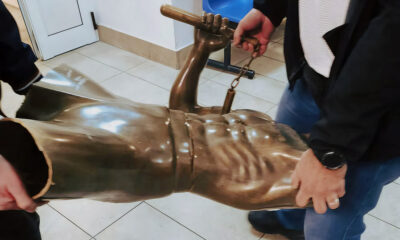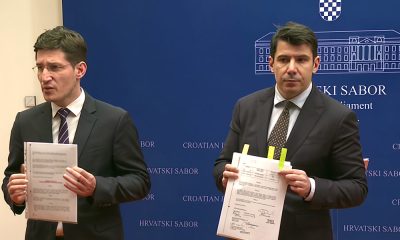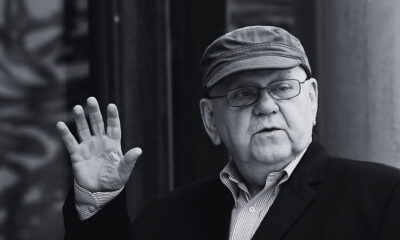English
Jánosík in Bosnia, more precisely in Herzegovina

The great mountain robber, the Slovak Robin Hood, Juraj Jánosík, came to mind because, according to the report of the Croatian national news agency HINA, his descendants have found refuge in Bosnia and Herzegovina. According to the news, the former head of the Slovak counterintelligence, who was convicted of corruption in Slovakia, fled to Bosnia and Herzegovina and is currently living in Mostar. According to the detektor.ba portal specializing in investigating criminal cases, Peter Gašparovič arrived in Bosnia and Herzegovina at the end of November 2023, crossed the border with a Slovak-registered car, and settled in Mostar. Slovak investigative journalists collaborating with Detektor recognized him at his residence. Slovak media released information in January that he was hiding in Bosnia and Herzegovina after confirmation through Interpol that he had also arrived in Bratislava.
At that time, Fico stumbled into this
As a reminder, charges were brought against Gašparovič in 2020 after the murder of investigative journalist Ján Kuciak and his fiancee Martina Kušnírová, revealing numerous corruption scandals and the involvement of high-ranking officials in the police, tax administration, and SIS in criminal activities. As a result, Fico had to resign from the prime ministerial position, from which he successfully returned in 2023.
Gašparovič was sentenced to 22 months in prison and a fine of €20,000 for corruption in 2022. Since his arrest in December 2020, he had been in custody, and he was conditionally released in August 2022 after serving two-thirds of his sentence. He then decided to go to Bosnia and Herzegovina, and in Slovakia, he is considered a fugitive.
Gašparovič’s defense appealed the court’s decision, but they also anticipated the proposed amendment to the penal code by the Fico government, which could override the judgment in the case.

Peter Gašparovič fled to Mostar and sought asylum there. He is the third high-ranking Slovak security officer to seek asylum in Bosnia in the past few years (Source: BIRN)
The European Brazil
After Gasparovič, Marian Kučerka, and Ján Kaľavský, high-ranking officials of the Slovak National Crime Agency (NAKA), also found refuge in Bosnia and Herzegovina, the question naturally arises: why? Kučerka has been convicted in legal force, while Kaľavský has been sentenced in the first instance after both were found guilty of bribery and participation in office abuses.
According to Veldin Kadić, a professor at the Department of Security and Peace Studies at the University of Sarajevo, “it’s a bit hard to believe the story that people who don’t know each other and face the same problems in their own country accidentally chose Bosnia and Herzegovina as a potential refuge.”
The explanation might be that it’s not baseless; the complex political situation in Bosnia and Herzegovina and the unclear and slow procedures related to asylum could result in legal confusion regarding possible extraditions, potentially dragging the proceedings for years.
And if somehow they manage to obtain Bosnian citizenship, which is not unthinkable with the help of political connections, then they would be entirely safe because Bosnia and Herzegovina does not extradite its citizens.
In Croatia, it has long been a trend for those who have trouble with the law to take their hat and slip across the border. Examples include Branimir Glavaš, the former county prefect of Osijek-Baranja convicted of war crimes, or Zdravko Mamić, the manager of Dinamo Zagreb, who made serious millions in the club, and I’m not talking about forints here.
However, speaking of national currency, our little article in Hungary might give some people ideas on how to secure themselves for the “just in case.” Because, you know, life is like a reed; today you may laugh, but tomorrow Uncle Pipacs comes with the kitchen knife…
Friday mess after Jánosík
The weekend’s light topic was provided by this week’s Mobile World exhibition in Barcelona. Beyond all kinds of mobile and wireless gadgets, a real flying car was also presented, which, according to the American Alef Aeronautics, they plan to launch on the market by the end of 2025 after obtaining the necessary permits.
Among the sci-fi-like affairs, the calling application presented by the Dutch startup Whispp is noteworthy. This app uses artificial intelligence technology to simultaneously transform the user’s natural voice affected by conditions such as throat cancer, stroke, or stuttering.
Unlike other solutions designed for people struggling with difficulties that convert speech into text, the application allows users to speak with anyone they want on their phone or computer and maintain the natural flow of conversations.
And last but not least: the greatest joy is schadenfreude.
In Barcelona, Huawei introduced the latest version of 5G, cleverly named 5.5G. The new standard dramatically increases download speeds, with 5.5G boasting ten times the original 5G, reaching 10 Gbps compared to the original 1 Gbps.
And this is not some laboratory trick; 5.5G is expected to be available in China by 2024, and reports suggest that the wealthy Gulf countries are already showing great interest in the new technology. This might make someone very angry in the United States.
-

 Szerbia5 nap telt el azóta
Szerbia5 nap telt el azótaVitték, mint a cukrot: Szabadkán ezernél is több ingatlan kelt el egy év alatt
-

 Szerbia4 nap telt el azóta
Szerbia4 nap telt el azótaAz autonómiatörekvésektől a Szerb Vajdaságig, a VMSZ a csetnikvajdáékkal kokettál
-

 Horvátország4 nap telt el azóta
Horvátország4 nap telt el azótaA HDZ nyert, a szociáldemokraták végeztek a második helyen
-

 Egyesült Államok5 nap telt el azóta
Egyesült Államok5 nap telt el azótaNövelik a NATO-erőket Boszniában és Koszovóban, nehézfegyvereket is telepítenek a térségbe











































































